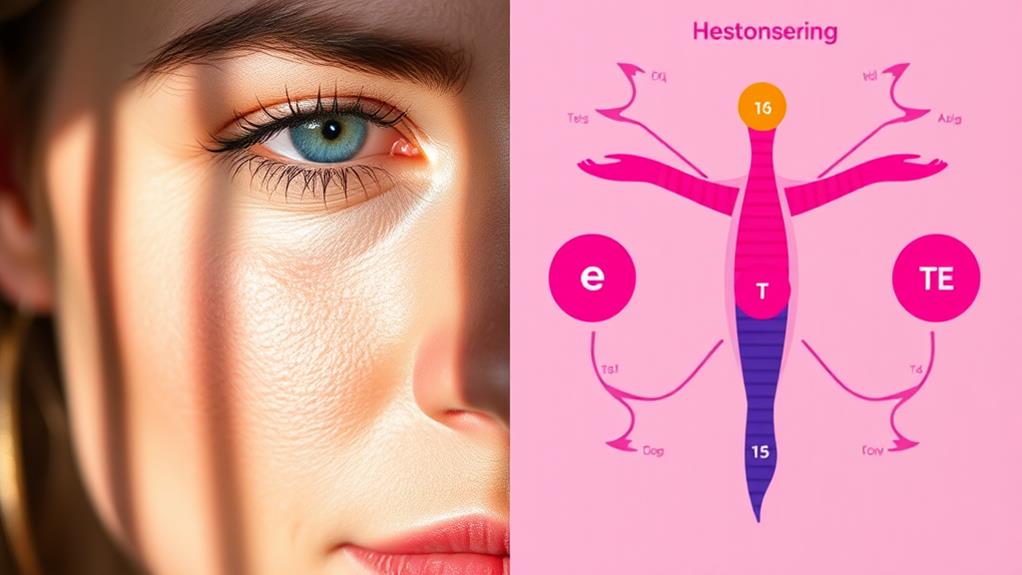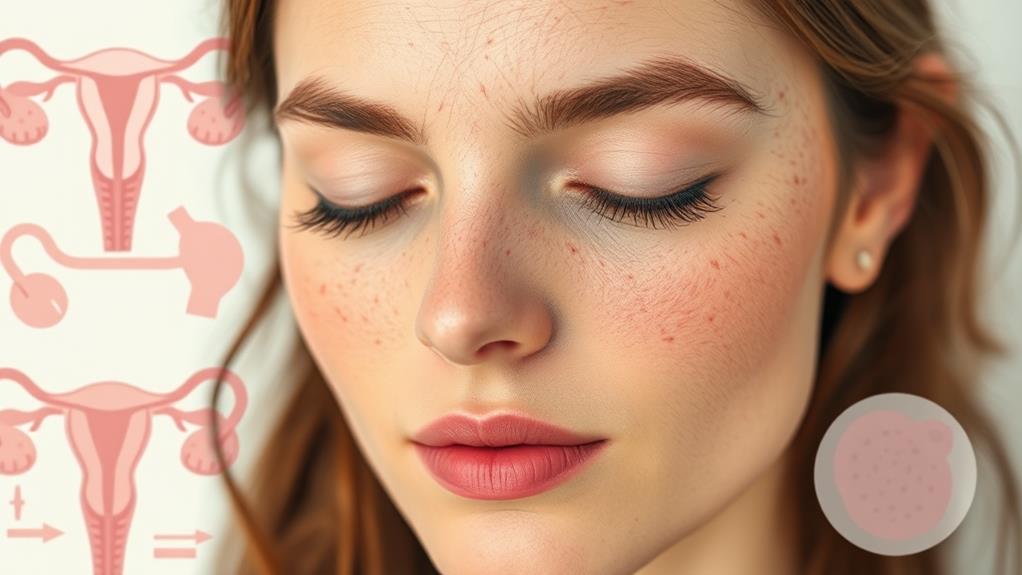If you've noticed excessive facial hair, you might be wondering what's driving this change. Hormonal imbalances, particularly elevated testosterone levels, can play a significant role, often linked to conditions like Polycystic Ovary Syndrome (PCOS). However, it's not just hormones at play; genetics, medical issues, and even lifestyle choices can influence growth. The interplay of these factors can be complex, leading you to question what might be affecting your situation specifically. Understanding the various causes could lead to effective solutions—let's explore what you need to know.
Hormonal Imbalances

Hormonal imbalances can greatly contribute to excessive facial hair in women, and understanding this connection is essential. You might be wondering why this happens. Well, it's mainly because hormones like testosterone can sometimes go a little overboard.
When your body produces more testosterone than usual, it can lead to unwanted hair growth in places like your chin or upper lip.
Imagine your hormones as a team of tiny players. When they're all working together, everything runs smoothly. But if one player decides to hog the ball, things can get messy! In this case, too much testosterone can throw the whole team off balance, leading to those pesky hairs sprouting up where you don't want them.
Other hormones, like insulin, can also play a part. If your body becomes resistant to insulin, it might lead to even more testosterone production.
Genetic Factors
Genetic factors play a significant role in determining how much facial hair you might have. If your mom, grandma, or even your aunts have thicker facial hair, you might find yourself in the same boat. It's like inheriting a quirky family trait, except instead of a funny laugh, it's hair you didn't ask for! Your genes carry the information that tells your body how much hair to grow and where to grow it.
Some women have a higher sensitivity to androgens, which are hormones that can boost hair growth. If you've got those genes, you might notice more hair on your face than you'd like. It's not your fault, and it doesn't define your beauty! Many women are in the same situation.
Also, remember that everyone's body is unique. Just because your cousin has peach fuzz doesn't mean you'll too. Embrace your individuality, and know that it's totally okay to seek solutions if you want to manage your facial hair.
After all, every star has their own shine, and you're no different!
Polycystic Ovary Syndrome

For many women, excessive facial hair can be linked to Polycystic Ovary Syndrome (PCOS), a common hormonal disorder. If you find that you're dealing with unwanted facial hair, it might be time to reflect on PCOS as a possible culprit. This condition can cause your body to produce more testosterone than usual, which can lead to those pesky hairs popping up in places you don't want them.
You might also notice other symptoms, like irregular periods or weight gain. It's like your body's way of saying, "Hey, I'm out of balance!" While it can feel frustrating, knowing the cause can help you find solutions.
Don't worry; you're not alone! Many women share this experience. Consulting with a healthcare provider is a great first step. They can help you understand your symptoms better and discuss treatment options.
Sometimes, lifestyle changes can make a big difference, too! So, whether it's adjusting your diet or finding a good skincare routine, there's hope. Remember, it's all about finding what works for you, and there are ways to manage PCOS effectively, so you can feel your best!
Other Medical Conditions
Have you considered that excessive facial hair might be linked to other medical conditions beyond PCOS? It's true! Conditions like Cushing's syndrome can lead to higher levels of cortisol, which might cause unwanted hair growth. This syndrome can also bring other symptoms, like weight gain and mood changes, making it essential to get checked out if you're experiencing these issues.
Another condition to think about is adrenal hyperplasia. This happens when your adrenal glands produce too many hormones. The result? You guessed it—excess hair! It's more common than you might think, so don't hesitate to ask your doctor about it.
Thyroid problems can also play a role. An underactive thyroid, known as hypothyroidism, can cause hormone imbalances, leading to increased hair growth. If you're feeling tired, gaining weight, or experiencing hair changes, it's worth talking to your healthcare provider.
Lastly, certain tumors, although rare, can cause hormonal shifts that lead to excess facial hair. It's always better to be safe than sorry, so keep an open line of communication with your doctor.
Understanding these conditions can help you get the right support and feel more like yourself again!
Medications and Treatments

When dealing with excessive facial hair, exploring medications and treatments can be a game changer. You might feel frustrated, but don't worry—there are options available that can help!
One common treatment is medication that reduces hormones called androgens. These medications can help lower hair growth in some women. Your doctor might also suggest birth control pills, which can balance those pesky hormones.
Another exciting option is a medication called spironolactone. It works by blocking the hormone's effects, and many women find it helpful. But remember, it's important to consult with your doctor before starting any new treatment. They'll know what's best for you!
If medications aren't your thing, you can explore topical treatments like eflornithine cream. It's applied directly to the skin and can slow down hair growth.
Plus, hair removal methods like laser treatments or electrolysis can provide longer-lasting results.
Age and Menopause
As women age, especially during menopause, hormonal changes can considerably impact facial hair growth. You might notice you're suddenly sporting a few extra chin hairs or fuzzy cheeks, and it can feel a bit like your body's playing a prank on you. Don't worry; you're not alone!
During menopause, your estrogen levels drop, while testosterone levels may increase relatively. This shift can lead to an imbalance that causes more hair to grow in places you mightn't want it. It's like your body's way of saying, "Surprise!"
But don't let it get you down. Many women experience this, and there are ways to manage it. You could try over-the-counter creams or even visit a dermatologist for advice.
Plus, some ladies find that simple lifestyle changes, like eating a balanced diet or exercising, can help keep things in check.
Environmental Influences

Several environmental factors can contribute to excessive facial hair in women, often exacerbating hormonal imbalances. You mightn't realize it, but the world around you can play a big role in how your body functions.
For example, exposure to certain chemicals in pesticides, plastics, or cosmetics can disrupt your hormones. Yep, that's right! Even your favorite lotion might've ingredients that don't work well with your body.
Air pollution is another sneaky culprit. It can lead to inflammation, which can throw your hormones out of whack. When that happens, you might notice unwanted hair popping up in places you'd rather not have it.
Stress is another factor to take into account. While you might think of it as a mental issue, stress can also lead to physical changes in your body, including hormonal shifts.
Lifestyle Choices
Lifestyle choices play a significant role in managing excessive facial hair in women. What you eat and how you live can really make a difference! For instance, a balanced diet rich in fruits, vegetables, and whole grains can help keep your hormones in check.
On the flip side, indulging in too much sugar or processed food mightn't do your body any favors.
Staying active is also super important. Regular exercise helps regulate your hormones, and it can even boost your mood. Plus, who doesn't feel great after a good workout?
Sleep is another biggie. If you're not getting enough shut-eye, your body can produce more hormones that lead to unwanted hair growth. So, prioritize those zzz's!
Lastly, be mindful of your skincare routine. Using the right products can help with hair removal and keep your skin healthy.
All in all, making small, positive changes in your lifestyle can help you feel more in control of your body. Remember, it's all about balance!
Stress and Mental Health

Stress can considerably impact excessive facial hair growth in women, often exacerbating hormonal imbalances. When you're stressed, your body releases cortisol, a hormone that can mess with your balance of other hormones.
It's like a chain reaction; if cortisol levels rise, it might lead to an increase in androgens, the hormones linked to unwanted hair growth. So, the next time you feel overwhelmed, remember that your body might be reacting in ways you don't expect!
But it's not just the hormones; stress can also affect your mental health. You might find yourself feeling anxious, which can lead to even more stress.
It's like being stuck in a loop! Stress might make you want to hide away, but tackling it head-on can help. Engaging in fun activities, talking to friends, or trying relaxation techniques can really help break that cycle.
Effective Treatment Options
Finding effective treatment options for excessive facial hair can be a game changer, especially when stress and hormonal imbalances have taken a toll. You're not alone in this! There are various ways to tackle the issue, and it all starts with understanding what works best for you.
First up, consider over-the-counter creams or gels designed to slow hair growth. They're like magical potions—minus the sparkles!
For a more permanent solution, laser hair removal is often a popular choice. It zaps those pesky hairs away and can leave your skin smoother than ever.
If you're looking for something a bit more natural, you might want to try waxing or threading. These methods can be done at home or at a salon, and they can give you a break from shaving. Plus, they usually last longer!
Lastly, don't forget to check in with your doctor. Hormonal treatments can be really effective if hormonal imbalances are the culprit. It's always good to have a professional on your side.
Whichever option you choose, remember to be kind to yourself. Everyone's journey with excessive facial hair is unique!
